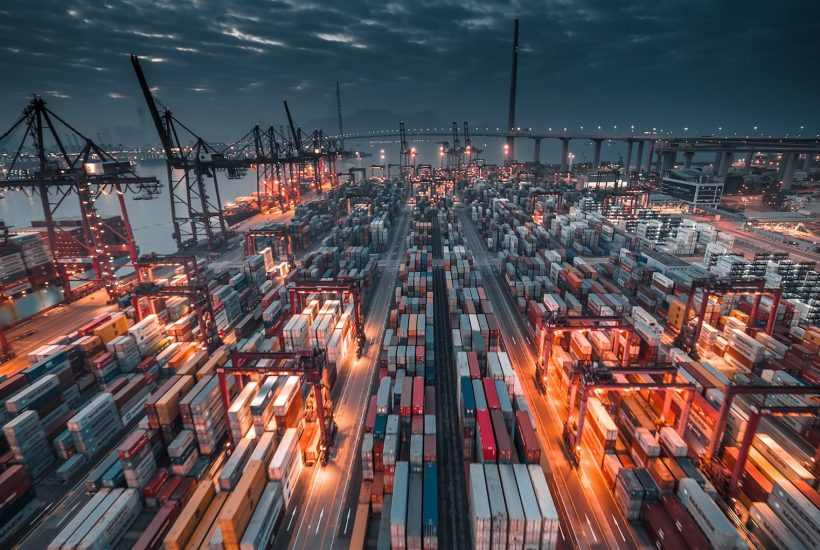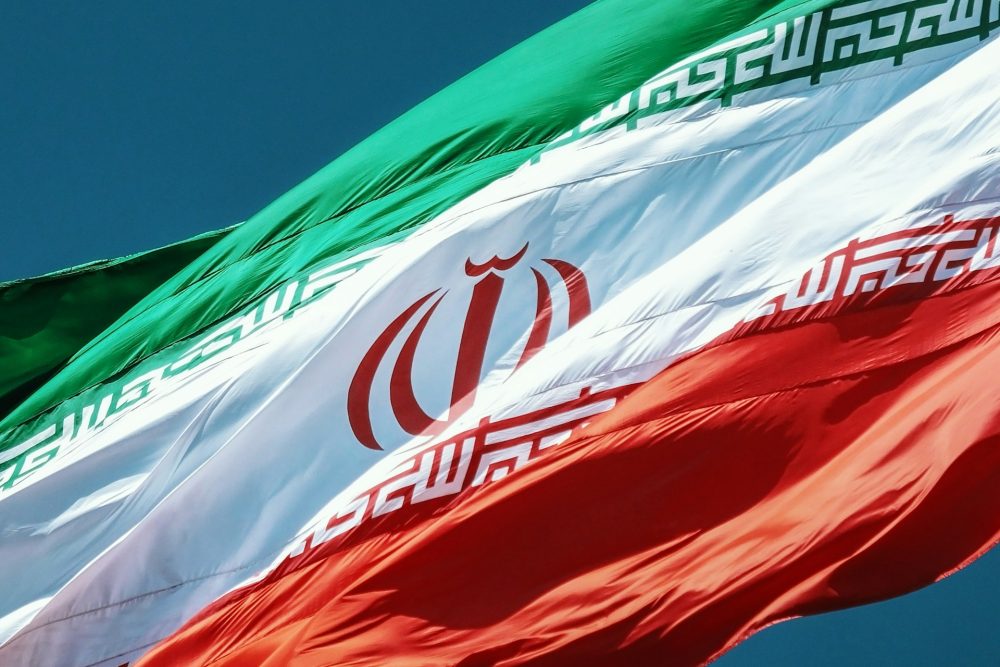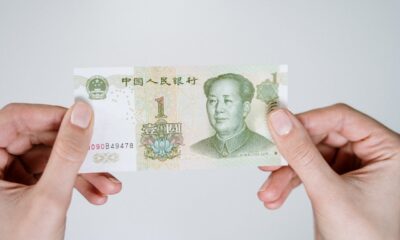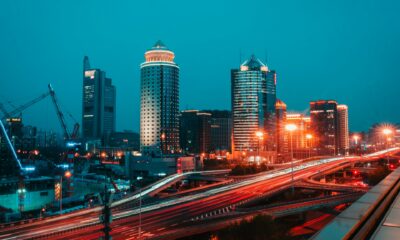Business
International Freight, the First Witness to the Fractures of Globalization
After years of globalization, fractures are beginning to emerge, particularly in the global shipping industry. But, while we might be quick to blame obvious factors like the war in Ukraine, the problem is a complex one in need of further consideration. In the meantime, a popular alternative in board rooms today is the idea of “nearshoring” everything, thus reducing dependence on global shipping.

A few weeks ago, Marie-Christine Lombard summed up the situation in globalization and transporting goods during the Paris Air Forum. The CEO of Geodis, an SNCF subsidiary dedicated to freight, declared: “We follow our customers where they go by managing their global logistics. As soon as there was globalization, which has existed since the 1990s or thereabouts, all the products that we consume are made in China – I’ll be cutting it short – we have to repatriate these finished or semi-finished products so that they go to consumer markets.”
She suggested that, whether by road, rail, sea, or air, it is up to the logisticians to build a robust supply chain to ensure transport on time and at the appropriate costs. However, new factors have come to superimpose themselves more and more strongly on these economic criteria: geopolitics, predictability, and ecology. This is to the point of redefining patterns that have been anchored for thirty years, suggesting an initial fragmentation of globalization.
The war that broke out at the end of February with Russia’s invasion of Ukraine was certainly a shock to the world economy. And with rising inflation, a worsening energy crisis, and a high level of ‘uncertainty, the situation is certainly not insignificant for the transport of world goods.
The War in Ukraine, a Secondary Factor
Many logistics players do not see this conflict as a primary element in the current disruptions in global logistics. This is the case of Henri Le Gouis, Managing Director Europe of Bolloré Logistics: “I see the war in Ukraine more as an aggravating factor than as a triggering factor. Above all, because Ukraine and Russia weighed marginally in world trade. He then explains that the flow of goods to Ukraine and Russia quickly dried up. While there is still some residual activity, the main difficulty lies in the management of sanctions against Russia, with strict compliance obligations, and war zone risk management for Ukraine.
Henri Le Gouis does not deny that the rupture of certain flows was complicated to manage, but it is essentially a question of flows between China and Europe passing through Russia. This is the case for rail links, “but this represented 600,000 TEUs per year [editors note: TEU is a twenty-foot equivalent, a unit of measurement of a standard container], or 300 boats. It was an extra formula. This is not what blocks global flows on its own”.
The observation is similar on air links, even if Marie-Christine Lombard notes a greater impact. The sanctions led to the disappearance of the market of Russian operators, who provided 20% of China-Europe air flows, forcing shippers to find other operators to provide these links.
The Heavy Impact of China’s “Zero Covid” Policy
For Henri le Gouis, the Chinese “lockdown” decided by the government to deal with the epidemic was another pair of sleeves: “It was much more complicated to manage, with periods of deficient activity and, now, a very gradual restart. It is, therefore, necessary to decide whether or not to charter planes. The choices you make based on your assessment of the recovery speed have serious consequences. In the air sector, we no longer have the holds of the passenger planes, which provided most of the capacity. This is an exercise we engage in weekly to adapt our capacities as closely as possible to demand.”
“For me, the main disturbing factors on a global scale are the upheavals of China and its policy of “zero Covid.” It had a much more devastating effect on our supply flows than the war in Ukraine. China is today the highway for global freight, whether on the transpacific or to Europe,” believes Henri Le Gouis, Managing Director Europe of Bolloré Logistics.
This need for continual adaptation is also found in the maritime sector with constantly updated schedules and a detrimental lack of visibility at a time when the supplies of many industries are already under extreme pressure.
A specialist in the sector insists that, since Covid, agility has become essential in managing logistics flows. As Henri Le Gouis adds, this is now anchored in the DNA of logisticians who now face repeated crises. In addition to the elements already mentioned, it adds port congestion, which affects the major ports on the East-West axis, and causes waiting times of 24 to 72 hours with chain consequences for all the logistics flows concerned.
The Place of China Called Into Question
More than the Russian-Ukrainian war, what is happening in China has an impact on world trade, and this could go far beyond a simple economic upheaval. The unpredictability of the Chinese government’s decisions – as shown by the management of the Covid crisis with a country that could be paralyzed in a few hours – created a climate of uncertainty little appreciated by international economic players.
Marie-Christine Lombard deciphered this phenomenon at length during the Paris Air Forum: “According to what our customers tell us, the first Covid crisis in China was experienced as ‘it’s terrible but it happens to everyone, we will do the big back and continue with our facilities”. Then there was an awareness of the strategic dimension of logistics, and supply risks entered the heart of the debate: “our clients’ boards of directors looked into the resilience of supply chains, asking for explanations on the places of production, the selection of suppliers, the delivery of finished products…”
And, according to the boss of Geodis, the change is accelerating today: “Now, these same boards of directors are asking to reduce dependence on certain countries in production. It’s evident. We hear a lot of talk of relocation, of “nearshoring,” that is to say, redoing things near consumer markets and reducing dependence on certain geographies for risk management issues.”
“Free Trade Will Not Emerge Unscathed From the Latest Crises.”
Henri Le Gouis observes the same trend: “What our clients are looking for is to know if tomorrow there is one way or another to reduce their dependence on China. It’s been two and a half years since they suffered all the ups and downs of Chinese production, not just linked to the Covid, and we feel that the climate where everything was easy there has now disappeared.”
The European boss of Bolloré Logistics goes even further: “There is a geopolitical factor. Free trade and globalization will not emerge unscathed from the latest crises. We sense the rise of blocs weaponizing global trade, with sanctions policies that may be accompanied by export or import restrictions. Even if it takes time, it will push for the regionalization of exchanges, and there may be more complicated exchanges with certain blocks than with others. These are trends that are likely to last.”
__
(Featured image by Timelab Pro via Unsplash)
DISCLAIMER: This article was written by a third party contributor and does not reflect the opinion of Born2Invest, its management, staff or its associates. Please review our disclaimer for more information.
This article may include forward-looking statements. These forward-looking statements generally are identified by the words “believe,” “project,” “estimate,” “become,” “plan,” “will,” and similar expressions. These forward-looking statements involve known and unknown risks as well as uncertainties, including those discussed in the following cautionary statements and elsewhere in this article and on this site. Although the Company may believe that its expectations are based on reasonable assumptions, the actual results that the Company may achieve may differ materially from any forward-looking statements, which reflect the opinions of the management of the Company only as of the date hereof. Additionally, please make sure to read these important disclosures.
First published in La Tribune, a third-party contributor translated and adapted the article from the original. In case of discrepancy, the original will prevail.
Although we made reasonable efforts to provide accurate translations, some parts may be incorrect. Born2Invest assumes no responsibility for errors, omissions or ambiguities in the translations provided on this website. Any person or entity relying on translated content does so at their own risk. Born2Invest is not responsible for losses caused by such reliance on the accuracy or reliability of translated information. If you wish to report an error or inaccuracy in the translation, we encourage you to contact us.

-

 Markets2 weeks ago
Markets2 weeks agoShockwaves of War: U.S. Strikes Iran, Markets Teeter, Global Risks Rise
-

 Fintech1 day ago
Fintech1 day agoRipple Targets Banking License to Boost RLUSD Stablecoin Amid U.S. Regulatory Shift
-

 Crypto1 week ago
Crypto1 week agoCoinbase Surges: Bernstein Targets $510 as COIN Hits Highest Price Since IPO
-

 Markets4 days ago
Markets4 days agoCoffee Prices Decline Amid Rising Supply and Mixed Harvest Outlooks






















